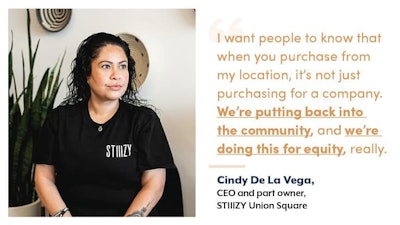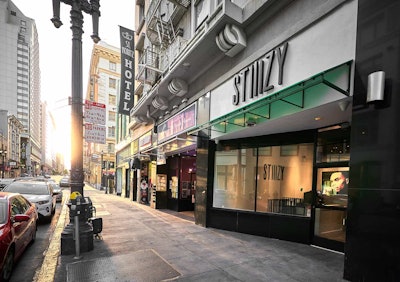
Cindy De La Vega, in her own words, has “been through a lot of things.” A victim of domestic violence, a witness to shootings, but also a mother of two daughters and decades-long community activist with United Playaz, she has seen the good with the bad.
Now, she’s the first Latina dispensary owner in San Francisco. On Oct. 9, De La Vega opened STIIIZY Union Square, where she serves as CEO and a part owner alongside Shryne Group, which oversees the STIIIZY brand.
“I want people to know that when you purchase from my location, it's not just purchasing for a company,” De La Vega tells Cannabis Dispensary. “We're putting back into the community, and we're doing this for equity, really.”
In 2018, De La Vega, a Latina, first applied to be a social-equity dispensary owner through the San Francisco Equity Program. The process to become verified as an equity applicant, obtain a license and permit, and become a 40% owner in STIIIZY Union Square was a long one. (Shryne Group’s employees are 51% Latinx, and it several women serve in company leadership, according to a press release.)
“You need to find your location, you have to have finances—and someone like me, where I come from, I don't come from money,” says De La Vega, who grew up in housing projects in San Francisco’s Sunnydale neighborhood. “I wouldn't have been able to do it on my own because you have to secure the location once you put in your application.”
San Francisco is currently only processing cannabis business applications from “Equity Applicants,” “Equity Incubators,” former medical operators and certain businesses that are already verified with the city’s Office of Cannabis. De La Vega was the 11th social-equity applicant to receive a permit from the city. In this climate, she says investors tried to take advantage of her situation.
“I had a few letters that I had received where people were offering me a lot of money to sell my permit, basically,” she says. “So, when I realized how much people were willing to give for it, I knew that it was something very valuable that I had to hold onto, that it wasn't about the money; it was more about the platform and … the opportunity that I'm going to have to better our community, our city.”
United They Stand
As a community activist with the violence-prevention and youth-development group United Playaz, De La Vega participates in programming such as gun buybacks—then working with the youth to make art from those weapons parts—and feeding the homeless. Based in San Francisco, United Playaz now has chapters in New York and the Philippines, De La Vega pointed out.
“My goal is that now that I've gotten this opportunity [at STIIIZY Union Square], I'll be able to help expand [United Playaz] and give our support to our communities because that's what we need; we need more support; we need to know that there is a better way out,” she says. “You just have to put in the work.
“I think that a lot of the people in the communities where I come from—we don't know that. We weren't taught that. So, I really want to make sure that I answer everyone's question and that they understand that I am just like them. I'm no different. My title may be different now, but I'm still Cindy De La Vega and live in the low-income units.”
During a session of the National Association of Cannabis Businesses’ (NACB) virtual 2020 Social Equity Conference on Nov. 16, De La Vega said she may not have the college degree or the funds that many other cannabis business owners do, but she puts in the work required to run a business. She encouraged people to not give up on their social-equity plans because “that's just when all these investors and people parachute into your communities, your cities, and they take over.”
“I honestly did this because in my heart I felt that being a CEO was the only way that I would be able to show people like me, that look like me, that come from where I come from, that you could actually make it,” De La Vega said during the session. “It's sad because it's bittersweet. … [T]here are still people that are being deported because of cannabis. There are still people that are in prison. And that's the bittersweet.”

Education in the Cannabis Market
In addition to her goal of expanding United Playaz and giving back to minority and low-income neighborhoods in San Francisco, De La Vega has committed to providing 20% of her business earnings to the San Francisco Equity Group (SFEG). She says those funds will go toward supporting other equity partners and making sure they don’t get taken advantage of.
De La Vega originally learned of the opportunity to become a part owner in a cannabis business from Rudy Corpuz, Jr., who is executive director of United Playaz and a leader of SFEG. (Corpuz, Jr. started United Playaz in 1994 and recruited De La Vega to join that year.)
Prior to opening her and STIIIZY’s store in October, De La Vega’s work experience included serving as a budtender and a receptionist. She also attended Oaksterdam University, the Oakland, Calif.-based cannabis college; sat in with a buyer; and trained and shadowed with STIIIZY, including at its flagship store in Los Angeles.
As education plays a role in the area of cannabis-business equity, there’s also education surrounding the product itself at STIIIZY Union Square. “I just want to continue to influence and inspire and innovate,” she says, taking a page from what the three I’s in STIIIZY stand for.
Tourists like pre-rolls, while flower, concentrates, vape pens and edibles are also all big sellers at the store, De La Vega says. But now, an increasing number of consumers ask about tinctures.
“That goes with not wanting to smell like it, or some people have never been consumers of it, like my mom, for example,” De La Vega says. “My mom had never consumed cannabis, so I had to start her off with tinctures.”
De La Vega says her mother uses cannabis tinctures, edibles and topicals for medical reasons, recently switching over from opioids and over-the-counter pain medications. Her mother was diagnosed with various ailments, including diabetes, high blood pressure and a fractured cervical spine that was causing paralysis. Since receiving a cervical spine fusion, she is no longer paralyzed but sometimes loses feeling in her legs.
“My mom is Christian Pentecostal, and I would have never thought that she would give me the time of day to actually trust me to treat her with the tinctures, and she did, and I am so happy because I've seen a change in her,” De La Vega says. “She's—no more zombie or depressed one minute or just sleeping all day.
“She's happy, and she giggles, and she talks about things, and she enjoys her food. It’s just such a difference when you treat someone with cannabis than when you treat them with opioids.”
COVID-19 Complications
Rolling with the punches in 2020 has led to some pleasant surprises since opening day, including an outpouring of support for Cindy De La Vega from Sunnydale.
She and STIIIZY originally planned to open the store on March 20, 2020, but she says they had to delay that timeline because of the COVID-19 pandemic and a flood.
“When they were doing the buildout, they hit a pipe and it ended up flooding the entire floor; it was just right before we laid the floor down. So, that pushed us down for another month,” she says. “So, our next plan was April 20, for 4/20, to open. And unfortunately, COVID hit, and that pushed us down until October 9.”
De La Vega says she is glad that STIIIZY Union Square is an essential business during the pandemic. The store’s employees, who wear masks, face shields and gloves, accommodate six customers at a time. They also require customers to wear masks and stay six feet from others, and they limit groups to two people.
“Health is our priority; we want to make sure no one gets sick,” De La Vega says. “Everyone's been pretty understanding about it, which is great because it's not easy to tell people, like, ‘Oh, no, you can't be with two other people; it can only be one or two at a time.’”
De La Vega says the turnout since opening day has exceeded her expectations. Her customers, who have formed lines around the block, have included people who heard about her story and wanted to show their support. “I'm so honored that I have people coming from Arizona, people from Sacramento and people that I've never met that heard about the story, and they're really passionate about equity and they want to support this partnership,” she says.


























